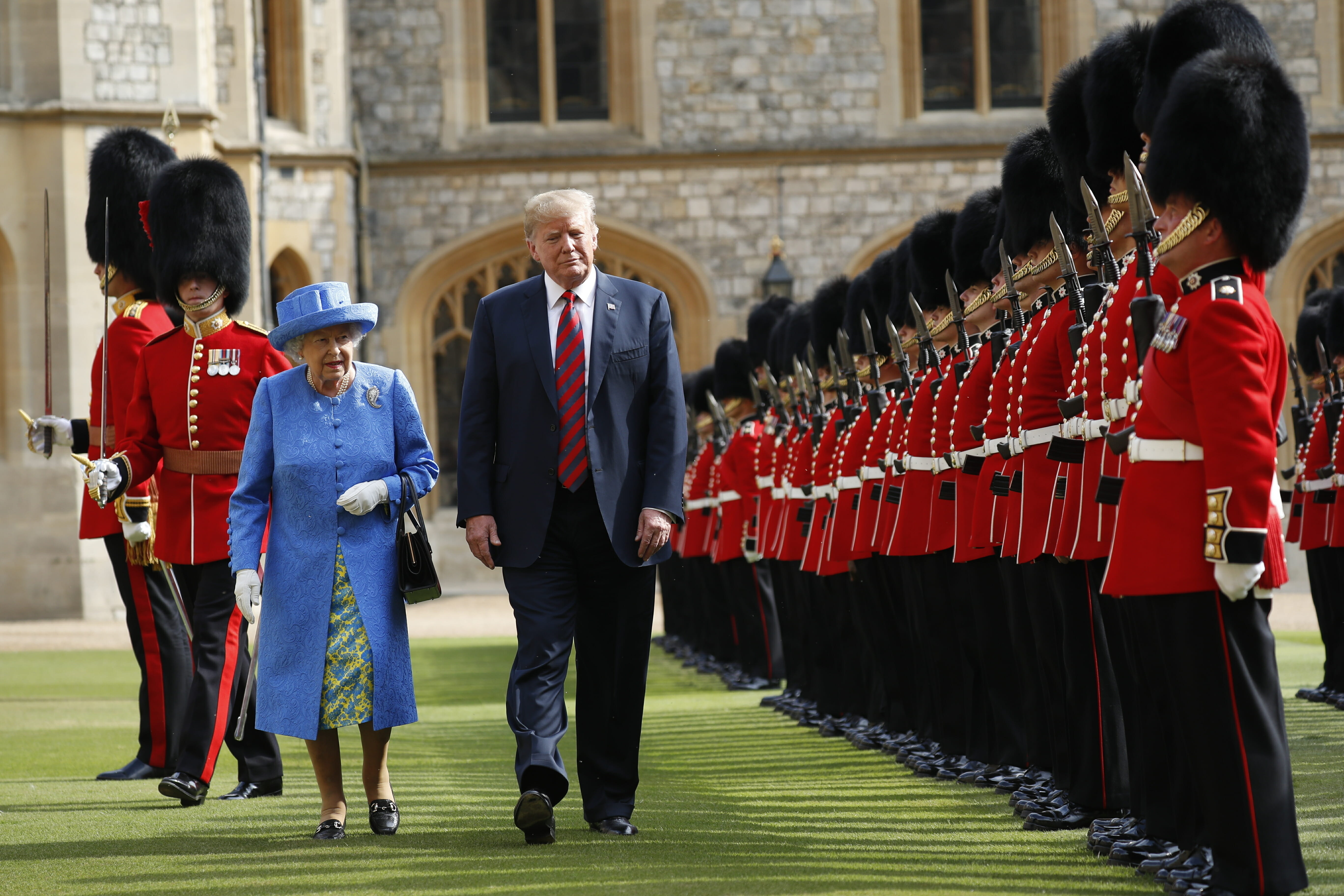
Watch out: Protocol pitfalls abound as Trump heads abroad
WASHINGTON (AP) — President Donald Trump was walking across the sun-splashed airport tarmac in Jerusalem with Prime Minister Benjamin Netanyahu in 2017 when the Israeli leader playfully warned his political ally about the confusing protocol he was about to encounter on his first visit to Israel as president.
“What is the protocol?” Trump asked his host, referring to the rules that govern how dignitaries interact. “You have any idea what it is?”
A smiling Netanyahu replied: “Who knows?”
Trump’s next few weeks will serve as a master class in the finer points — and potential pitfalls — of protocol as he makes state visits to Japan and the United Kingdom, meeting with both Britain’s Queen Elizabeth II and Japan’s newly installed Emperor Naruhito. Plenty of world leaders are tripped up by the intricacies, and Trump himself has a spotty record in his diplomatic dealings on the world stage.
He pushed his way to the front of a pack of world leaders as they got into position for a photo at a NATO meeting in Brussels in 2017. He belittled Canadian Prime Minister Justin Trudeau over Twitter after leaving a fractious meeting of the Group of Seven industrialized nations last year in Canada. And he walked steps ahead of the queen at Windsor Castle when the pair met for the first time last year.
For all of that, though, the president can’t seem to get enough pomp and pageantry. He raved about the reception he received in Asia in 2017, when China and other governments welcomed Trump by rolling out red carpets, staging military parades and putting on fancy dinners as he toured the region.
Trump’s penchant for flattery is not lost on the Japanese, with Prime Minister Shinzo Abe going all-out to become perhaps Trump’s closest friend among global leaders. The frills of a state visit, including meeting Naruhito and an imperial banquet, should bring out the best in Trump, said Michael Green, senior vice president for Asia and Japan chair at the Center for Strategic and International Studies.
“I think he’ll be on really good behavior,” Green said. “I think the Japanese knew very much what they were doing.”
With nothing left to chance, diagrams have been drawn up to help Trump rehearse his movements at the Imperial Palace, where he and first lady Melania Trump will meet Naruhito on Monday.
Officials there say they aren’t worried about any diplomatic blunders, noting that Trump’s meeting two years ago with then-Emperor Akihito went smoothly.
Governments across the globe, including the United States, employ officials who ground themselves in the ins and outs of protocol, the rules that govern how leaders and dignitaries interact and comport themselves. But leaders don’t always follow the instructions — for reasons as varied as a case of the nerves or sheer disregard of conventions.
Etiquette experts say protocol exists to provide structure and help put people at ease, and that those who disregard it send a signal that their own desires are more important than the feelings and expectations of others.
During a 2017 visit with Saudi Arabia’s royal family, Trump and King Salman drank traditional Arabic coffee in small cups. Seeing that Trump held the cup with his left hand, taboo in the Muslim world, Salman instructed Trump that religious tradition dictates using the right hand. Trump then replied: “Always the right hand, right. Always the right hand.”
Protocol has stumped other presidents and dignitaries, too.
In 1992, President George H.W. Bush slumped over and vomited in the lap of Japan’s prime minister during a state banquet in Tokyo. Bush was in the midst of a lengthy tour of Asia and had become nauseous between courses of raw salmon and grilled beef.
In 2011, President Barack Obama was zinged for talking as “God Save the Queen” began to play during his toast to the queen during a Buckingham Palace banquet. The orchestra started playing the British national anthem before Obama had finished the toast, which caused a bit of a stir at the dinner. She did not appear to be offended.
During an earlier Obama visit to London in 2009, first lady Michelle Obama was criticized for putting an arm around the queen and wearing a sweater to their first encounter.
Mrs. Obama, a well-known hugger, wrote in her memoir that she and the queen had bonded at the Buckingham Palace reception over their uncomfortable shoes and achy feet when the queen laughed. “I then did what’s instinctive to me anytime I feel connected to a new person … I laid a hand affectionately across her shoulder,” she said.
Royal protocol dictates that an individual wait for a sign from the queen or other family member that physical contact such as a handshake or an embrace is welcome. The former first lady said she tried not to let the ensuing media firestorm rattle her.
“If I hadn’t done the proper thing at Buckingham Palace, I had at least done the human thing,” Mrs. Obama wrote.
___
Associated Press writers Mari Yamaguchi in Tokyo, Jill Lawless in London, Aya Batrawy in Dubai, United Arab Emirates, and Josef Federman in Jerusalem contributed to this report.
___
Follow Darlene Superville on Twitter: http://www.twitter.com/dsupervilleap
The Western Journal has not reviewed this Associated Press story prior to publication. Therefore, it may contain editorial bias or may in some other way not meet our normal editorial standards. It is provided to our readers as a service from The Western Journal.
Truth and Accuracy
We are committed to truth and accuracy in all of our journalism. Read our editorial standards.
Advertise with The Western Journal and reach millions of highly engaged readers, while supporting our work. Advertise Today.












